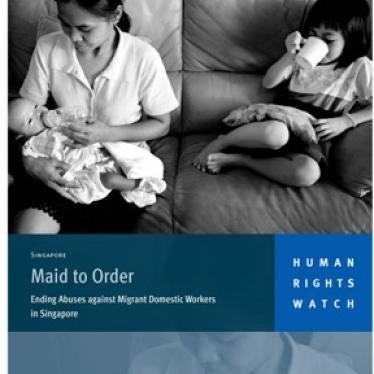(New York) - Singapore’s new standard contract for migrant domestic workers perpetuates discriminatory treatment and their exclusion from basic protections, Human Rights Watch said today. The contract clarifies service charges and refund policies for employers, but does not guarantee a weekly day off for workers or cap excessive recruitment fees.
Families in Singapore employ approximately 160,000 domestic workers, primarily from Indonesia, the Philippines, Sri Lanka and India. Many of these workers, who are by law excluded from Singapore’s Employment Act, labor without pay for months to settle debts to employment agencies, work long hours seven days a week, and are confined to the workplace.
“Domestics should enjoy the same rights as other Singaporean workers, including a day off, limits on their working hours and caps on salary deductions,” said Nisha Varia, senior researcher in the Women’s Rights division of Human Rights Watch. “This standard contract should make things clearer for employers, workers and agents, but it doesn’t do enough to improve basic working conditions.”
Human Rights Watch said that a positive step in the contract is a requirement that employers provide three adequate meals per day to domestic workers, over and above their salary. Food deprivation is one of the most frequent complaints of domestic workers who have faced abuse or exploitation during employment. In addition, employers who request replacements for a domestic worker must permit the rejected worker to seek new employment in Singapore instead of immediately repatriating them.
The new package includes a service agreement between labor agencies and employers, and an employment contract between employers and domestic workers. These contracts must be used by labor agencies if they want to be accredited and retain their licenses. The contracts were developed jointly by the two accrediting bodies for labor agencies, the Association of Employment Agencies of Singapore and CaseTrust, a consumer protection group.
Intense competition among the more than 600 employment agencies has led them to shift the cost of recruitment, transportation, training and placement from employers to domestic workers. Employers and labor agents often deduct the first four to 10 months of a domestic worker’s salary, out of a two-year contract, to pay these fees. However, the new contract does nothing to cap recruitment fees.
“Under this system, Singapore’s lowest-paid workers are subsidizing low agency fees for employers,” Varia said.
In addition, the new contract recommends, but does not require, that employers provide workers at least eight hours of continuous rest. Further, it gives employers the option of either providing the domestic worker one to four days off per month, or paying them extra if they do not take a rest day. Given the imbalance of power between employers and domestic workers, the waiver is open to high risk of abuse by employers who do not provide the additional payment or who coerce the worker to sign away her right to a day of rest.
“Domestic workers need regular days off to rest, to escape the isolation at work and sometimes to report abuse,” said Varia. “It’s shocking that an advanced economy like Singapore does not guarantee domestic workers a weekly day off.”
Human Rights Watch urged the Singaporean government and accreditation agencies to give domestic workers the same level of labor protections provided all other workers in Singapore under the Employment Act.







